In March 2014, a bunch of students from the University of Helsinki boarded on a ferry and crossed the sea to explore academic entrepreneurship. Academic Action Bootcamp is both a coaching programme for budding business ideas, an opportunity to get to know other students interested in changing the world and to connect with other builders of new kind of entrepreneurship culture in Europe. The teams were chosen based on applications.
Meet the teams of the bootcamp 2014: e-Puddle, Kuvio Adventures, Kiesus Learning, Kiitti, Oppimo, Copla, MemLab, Paraati, Animat, Bëëb and QRE!
LEARNING AND GAMES
E-puddle.com 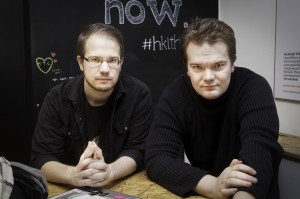 Team: Mikael Bertus, Valtteri Hyvärinen and Rosalie Kean (German philology)
Team: Mikael Bertus, Valtteri Hyvärinen and Rosalie Kean (German philology)
Idea: Our goal is a skill-oriented language learning network based on web services and applications which will make learning fun and addictive. We love learning, especially languages that are close to our hearts. We have had the good fortune to excel in a few, and later study them at university. The advent of web 2.0 and later mobile technologies have given new opportunities for people from all walks of life to seek out information, learn new skills and find out what their passions are. Unfortunately, we have encountered many problems with the language learning websites, networks and apps that are currently available. We aim to fill this need by creating a new social learning environment that is not only easy and accessible, but also fun to use. Our passion. Your empowerment.
Kuvio Adventures
Team: Tom Henriksson (University of Helsinki, World Politics) & co
Idea: An independent game studio that develops abstract, addictive games with an applesque style. The key idea is to first make great games based on how they work, feel and look: ten years of regular gaming experience has shown that this must be the starting point. The games will utilise some of the best business models in gaming, such as free to play system and paid boosters. However, the necessary condition of developing a good game having been reached, the ultimate idea is to use games for the benefit of society. This could comprise using game theory to understand international negotiations, developing games for meaningful learning (such as Fate of the World, a game on international climate politics) as well as delivering more general social messages through the art of games. First game, Clockwork, is to be finished this spring (board game), beta test for second one, Colornaut (mobile app), is planned for summer 2014.
Kiesus Learning http://www.uskonnotkartalla.fi/ & http://bit.ly/1leDEH3
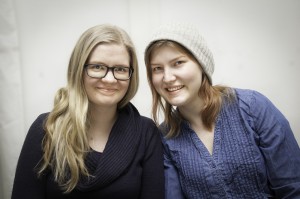 Team: Mari Huotari (University of Helsinki, theology) and Mira Rantakeisu (UH, theology and education) & Co
Team: Mari Huotari (University of Helsinki, theology) and Mira Rantakeisu (UH, theology and education) & Co
Idea: Our goal is to develop new and fresh learning materials, special focus being on teaching of the ethics and religion. Understanding of world religions is essential in a modern multicultural society, but often the teaching of religions lacks imagination and creativity. We want to make world religions visible in pupils’ everyday life. At the moment we are working on a ”Helsinki of Religions”-board game, a project that we started during our pedagogical studies in 2011. Our first goal is to develop a proper board game, which later could be turned into a digital game as well. Our team members have also been developing ”Religions on the Map”online service, which highlights the diversity of religious communities in Helsinki and nearby cities.
Kiitti Co-learning platform www.kiitti.fi (open feedback platform prototype)
 Team: Oskari Vinko (Aalto & University of Helsinki, Microchemistry) & Klaus Nygård (Aalto), Ville Miekk-oja (Aalto) and Henri Hänninen (Laurea)
Team: Oskari Vinko (Aalto & University of Helsinki, Microchemistry) & Klaus Nygård (Aalto), Ville Miekk-oja (Aalto) and Henri Hänninen (Laurea)
Idea: Solving problems together often results in greater motivation, greater rate of learning and less frustration. Our idea is to extend co-learning concept by building a Q&A platform on the internet where university students, professors and researchers can collaborate and solve each others issues, whether it’s about maths, chemistry, history or any other topic. It’s like Stack Exchange for universities. But we want to make it beautiful, easy, diverse and motivating (or even addictive). We’re using the future technologies such as AngularJS, which makes our web app lightning fast, comfortable and mobile friendly.
Oppimo

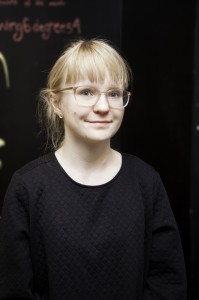 Team: Jenni Hämäläinen (UH, Political science and World politics), Mari Matsuzaki (UH, Political science and World politics)
Team: Jenni Hämäläinen (UH, Political science and World politics), Mari Matsuzaki (UH, Political science and World politics)
Idea: Oppimo is learning community, where university students can transform their academic learning experiences into ACTION. It aims to bridge the gap between academic study and practical working life. It provides a supportive environment, where students can utilize the theoretical knowledge gained from studies and transform it into actual practices. Students will be able to develop their knowledge and learn practical skills which can be used for future careers. Oppimo will provide both a physical and a virtual learning community, connecting students from different backgrounds and companies from different fields together. It will focus on proving possibilities for everyone to gain skills, to do projects, workshops and to network with other students and professionals. We organised the first event in November 2013, which was a success.
HEALTH
The COPLA scaffold – a new solution for cartilage repair
Team: Virpi Muhonen (UH) & Elina Järvinen (UH), Ilkka Kiviranta (UH), Anne-Marie Haaparanta (TUT) and Minna Kellomäki (TUT)
Idea: Damaged articular cartilage causes severe pain and disability for the patient and strains the society with long-term work absences. The aim of an articular cartilage repair treatment is to restore and maintain the normal function of the joint. However, treatment of articular cartilage lesions of the knee remains a challenge. Our mission now is to develop and bring the novel COPLA scaffold into clinical use in order to improve and maintain a high functionality and quality of life for patients, whilst being a user-friendly and cost-effective cartilage repair method. Members of our group are strongly interested in launching a start-up and to bring the COPLA scaffold to the market. We are active, motivated and fully dedicated to capitalize the COPLA scaffold.
MemLAB
Team: Sara Liljander (University of Helsinki, physics) Idea: MemLAB is a private healthcare company specialized in early diagnosis of memory disorders. MemLAB provides a new method for differential diagnosis of dementias and for monitoring progression of the disease and responsiveness to treatment. The method is based on measuring brain activity (EEG) and serves as an accurate (accuracy in the region of 90 %), non-invasive, objective, and cost-effective diagnostic aid for clinicians to differentiate between cognitive impairment, Alzheimer’s disease, and other common types of dementia.
Terveyskollaasi
Team: Emilia Hjelm (University of Helsinki, Department of Computer Science) Idea: Wearable technology is on the cutting edge of consumer market. There are several activity promoting products, such as wearable sensors or in other words activity bracelets. Problem with these devices is that the gathered data (such as how many steps you have taken) is synced to these proprietary silos and it is hard to take the full benefit out of the experience. My idea is to create an open platform (and an application on top of that) to serve as a hub between people and their devices. You could sync your data automatically through your device manufacturers API or input the data manually. You could decide what you want to log, for example sports, water drinking, steps, heart rate, driving kilometers etc. You could compare and compete with your friends in challenges, regardless of their method of measurement.
OTHER SERVICES
Animat – a societal animation studio
 Team: Anna-Kaisa Tirkkonen (UH, development studies) and Kristiina Salo (Turku School of economics: management and organization, sustainable development)
Team: Anna-Kaisa Tirkkonen (UH, development studies) and Kristiina Salo (Turku School of economics: management and organization, sustainable development)
Idea: Creating an animation studio that uses animations and cartoons as a means to solve social and societal problems. Harnessing the profit potential of entertainment products and the attraction people have towards stories and to be entertained for societal progress in addition to offering food for the soul and the mind, so to speak. Our long term goal is the production of artistically high quality and financially profitable info animations, cartoon series and feature-length films. The topics of the animations can be linked to different social and societal problems and phenomena (e.g. human trafficking, environmental problems, etc). In the information animations this would be done more directly and in the cartoon series and feature length animation films more subtly. Part of the profits from the animations will be invested to help solve these and similar problems through different channels, for instance through NGO’s, community projects, innovation hubs, etc.
The aim is that in addition to these animations teaching the viewer something new directly or indirectly, they will also be engaging and visually and otherwise of top-notch quality of top-notch quality. Suitable content will be produced for children as well as for adults. The viewer should learn something new almost as if by accident. The animations will draw ideas, topics and insights from various scientific fields and their legacies, themes and theories (from art history to psychology, from folklore studies to biology, etc). The end goal is to create a financially profitable animation studio that will also create substantial additional value for society by stimulating discussion on different topics and raising funds for societally beneficial projects and processes.
BëëB – Beer Experiences & Education on Brewing
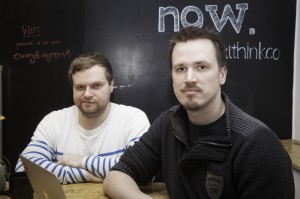 Team: Vertti Virkajärvi, Ville Makkonen, Petteri Hänninen (University of Helsinki, food economics)
Team: Vertti Virkajärvi, Ville Makkonen, Petteri Hänninen (University of Helsinki, food economics)
Idea: Beeb offers service concepts related to beer and brewing to consumer groups and commercial clients on site. We have a small scale brewery equipment and possibly a small pub, with prospects of expanding one day. Our venture combines simple consumer experiences and educational views for groups.
Paraati
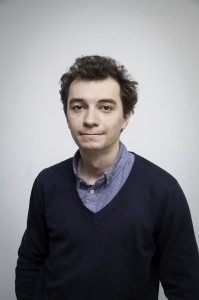 Team: Valtteri Koskinen (Uni Helsinki, Organisational studies)
Team: Valtteri Koskinen (Uni Helsinki, Organisational studies)
Idea:
There is an on-going paradigm shift towards co-produced economy, where once strict lines between the service producer and their customers are blurring. Customers are more often a co-producing party with the provider organization developing old services and, even more importantly, new innovations. There is a growing number of academic research on co-production, and the results speak for themselves. The customers find the co-produced services better and the organization gets to develop their offering and processes more accurately, effectively and faster. Still, end-users and customers are often only consulted on the results, not engaged in the development at all. Why? The purpose of this company-to-be is to solve the problems hindering the adaptation of user-based service development in companies and/or public organizations.
PARAATI offers a way for public organizations to develop their service processes and products with the end users efficiently and innovatively. The demand for future services is co-defined, co-designed and co-produced with the end-users through workshops and fast-track models. PARAATI is looking for expanding the public realm and democracy outside the elections to the administration and public services. We are the partner building better services for the welfare state of the 21st century.
QRE – “Quality renewable energy in developing countries”
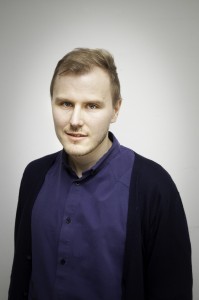 Team: Joni Karjalainen (University of Helsinki, Political Science & World Politics
Team: Joni Karjalainen (University of Helsinki, Political Science & World Politics
Idea: QRE provides needs-fit based consultancy services in product development for Finnish renewable energy (RE) companies. QRE helps companies to design their products for the needs of emerging markets such as the East African region. Potential customers who lack access to electricity expect RE solutions that are affordable, simple, reliable and of good quality. QRE works with Finnish RE companies and provides feedback for an enhanced process of product development. Product feedback is offered through two products: Quick Product Review (survey-based feedback methodology) as well as Field Exercise. The idea of QRE is based on on-going work in the NGO sector plus one-year research addressing energy questions and sustainability in East Africa. Development of the business model is fairly recent.
**********************************************
THE ACADEMIC ACTION BOOTCAMP 2012 The previous Bootcamp was organized in autumn 2012 and it resulted in 7 entrepreneur teams. The members of the bootcamp where from different faculties and majors. Back then we visited Amsterdam and Copenhagen, read a bootcamper’s experience and see the photos: THE IDEA AND ACTORS BEHIND THE BOOTCAMP The Bootcamp is part of the activities of Helsinki Think Company, the entrepreneurial space of the University and City of Helsinki. Bootcamp is led by Helsinki Think Company, Demos Helsinki and Avanto. The bootcamp is organised for two reasons: 1) To develop bootcampers’ own ideas: participants have their own and shared thought what they want to aim for as entrepreneurs and activists. This will be taken forward together . 2) To develop entrepreneurial activities at the University of Helsinki: on the bootcamp we look for and test ways to help students’ and researchers’ ideas fly. If you have questions, please contact Outi Kuittinen, Demos Helsinki, 050 326 55 82 or Antti Tarvainen, Avanto, 040 825 50 66.
“This is like The Amazing Race.” – Academic Action Bootcamper 2012
APPLY NOW!



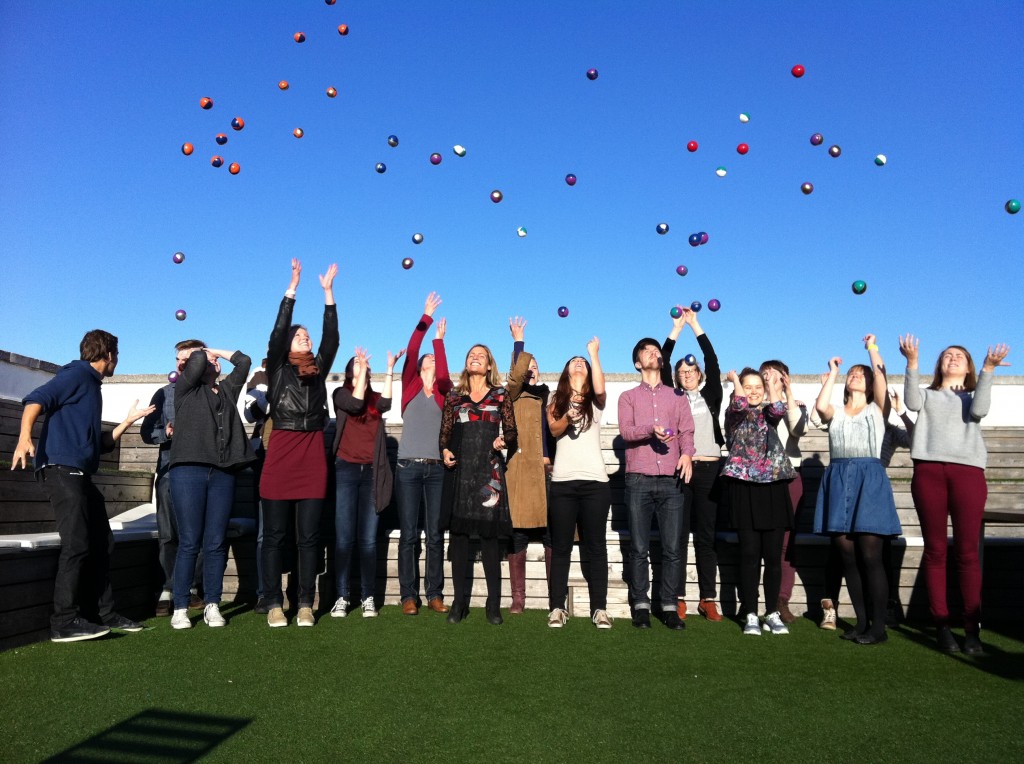
Moikka! Mielettömän kiinnostava ohjelma! Hakuaika on umpeutunut – onko kaikki paikat jo täytetty? Vieläkö voi hakea? Jos ei tällä kertaa, tuleeko uusia mahdollisuuksia? Heidi H.
Moi Heidi,
Hakuaika on umpeutunu ja campille lähtijät valittu. Järjestelemme kuitenkin ohjelmaa ulkopuolelle jääneille, ja olet tervetullut mukaan. Heitäppä sähköpostia host-thinkcompany@helsinki.fi, niin jutellaan lisää!